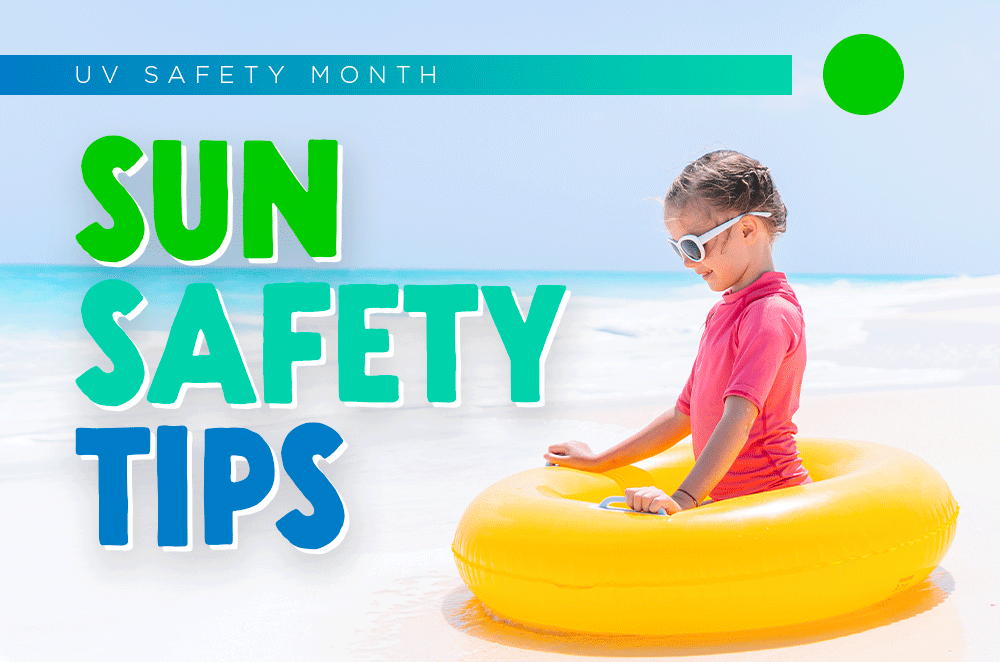Summer is here! It’s a time for barbecues, pool parties, camping trips, and all sorts of outdoor adventures. But while sunshine is a welcome part of the season, it’s important to remember that too much can be a health risk. Sure, some sun exposure helps our bodies create vitamin D which is needed for strong bones and a healthy immune system. But ultraviolet (UV) radiation from the sun can also damage our skin, leading to sunburn, premature aging, and even skin cancer. That’s why July is designated as UV Safety Month! Here at Comanche County Memorial Hospital, we want to make sure everyone in our community knows how to stay safe in the sun with some sun safety tips.
Summer Sun Safety Tips
Let’s make sure your summer adventures are filled with fun, not sunburn. Here are some sun safety tips to keep in mind:
Seek Shade
The sun’s rays are the strongest between 10 am and 4 pm. Whenever possible, plan outdoor activities for earlier mornings or later afternoons. If you’re enjoying a day at the beach or park, look for areas with natural shade from trees or bring an umbrella or pop-up tent.
Apply Sunscreen
Apply sunscreen liberally to all exposed skin at least 30 minutes before going outside. Don’t forget often-missed areas like your ears, lips, neck, and the tops of your feet. Choose a broad-spectrum sunscreen with SPF 30 or higher. For extended outdoor activities or if you have fair skin, consider SPF 50+. Reapply sunscreen every two hours, or more often if you’re sweating or swimming.
Wear Protective Clothing
Clothing provides a physical barrier against UV rays. Choose lightweight, loose-fitting clothing made from tightly woven fabrics. Look for clothing with an Ultraviolet Protection Factor (UPF) rating, which indicates how effectively the fabric shields you from UV rays. Wide-brimmed hats and sunglasses that block UVA and UVB rays offer additional protection for your head and eyes.
Stay Hydrated
Sun exposure can lead to dehydration, which can make you feel tired and sluggish. Drink plenty of water throughout the day, even if you don’t feel thirsty.
Protect Your Skin
Sun safety isn’t just about avoiding a sunburn. Here’s why it’s so important:
Premature Skin Aging
Excessive UV exposure breaks down the collagen and elastin in your skin, leading to wrinkles, age spots, and a leathery appearance. By following sun safety practices, you can help keep your skin looking youthful and healthy for longer.
Skin Cancer Risk Reduction
Skin cancer is the most common type of cancer in the United States. UV radiation is a major risk factor for all types of skin cancer, including melanoma, the most serious form. The good news is that skin cancer is highly treatable when caught early. Reducing your UV exposure and being aware of any changes in your skin can significantly decrease your risk.
Skin Cancer Screening
Your well-being is our top priority. If you notice any changes in your skin, like a new mole, a mole that’s changing size or color, or a persistent itch, don’t hesitate to schedule an appointment with one of our board-certified dermatologists. Early detection is important in the fight against skin cancer. Our dermatologists can perform a skin cancer screening and discuss any necessary treatment options.
Throughout July, we’ll be sharing additional resources on sun safety. Look out for information on recognizing skin cancer signs, sun safety for kids, and understanding the difference between UVA and UVB rays. By following these sun safety tips, you can enjoy the outdoors with confidence all summer long!
Resources:
https://www.cdc.gov/skin-cancer/sun-safety/index.html
https://www.fda.gov/consumers/consumer-updates/tips-stay-safe-sun-sunscreen-sunglasses
Disclaimer:
The Comanche County Memorial Hospital website does not provide specific medical advice for individual cases. Comanche County Memorial Hospital does not endorse any medical or professional services obtained through information provided on this site, articles on the site, or any links on this site.
Use of the information obtained by the Comanche County Memorial Hospital website does not replace medical advice given by a qualified medical provider to meet the medical needs of our readers or others.
While content is frequently updated, medical information changes quickly. Information may be out of date, and/or contain inaccuracies or typographical errors. For questions or concerns, please contact us at contact@ccmhhealth.com.

